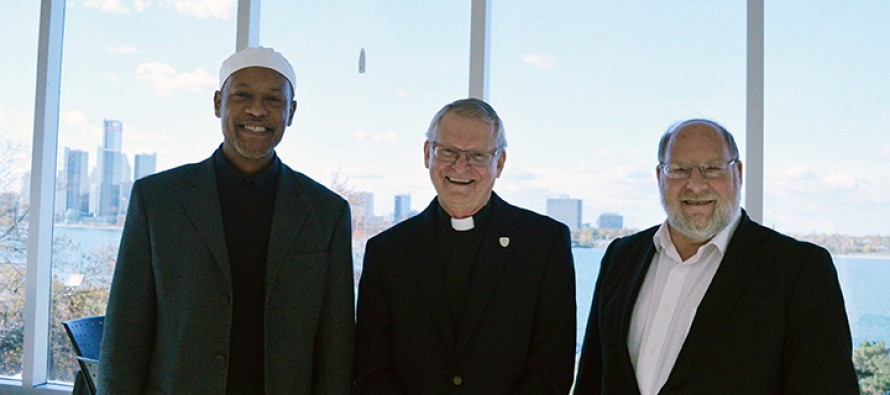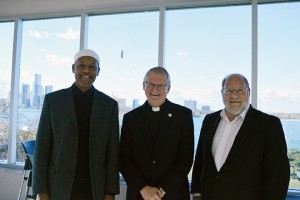Monotheistic religions discuss co-existance


Standing from left to right, Chaplain Imam Yasin Dwyer, Father Paul Mcgill and Rabbi Jeffrey Ableser are photographed in the Windsor Children’s Aid Center at 1671 Riverside Drive East on Oct. 25.
PHOTO BY/DAVID DYCK
In the midst of religious extremism, ignorance-based xenophobia and confusion about the relationship between religion and politics, several religious and spiritual heads showed mutual respect and understanding at a recent conference in Windsor.
At the annual event “Is compassion possible for our troubled world” held at the Windsor Children’s Aid Society, leaders from three monotheistic religions discussed co-existence and how to achieve closer proximity to their particular divinity.
Appreciating the pluralistic society of North America, the three religious leaders considered the benefit of living closely to other cultures. Imam Yasin Dwyer, chaplain at Queens University, likened intolerance between religions to dogs barking at strangers.
“We have to get to know each other,” said Dwyer. “We need not only to tolerate each other, a very inadequate term, we need to (also) value each other and then we will be able to co-exist in a beautiful and beneficial way.”
According to Father Paul McGill, pastor at St. Basil’s Congregation, misunderstanding between beliefs has led to a lot of hurt over the course of the world’s history. He said these things have continued to live on in people’s minds in the forms of prejudices and bigotry, but the last 25 years have greatly improved relations.
That doesn’t mean that perfect religious harmony has been completely achieved, however. Rabbi Jeffrey Yableser, the leader of congregation Beth El, said there will always be the “ick factor,” where one religion will be disturbed by the practices of another. He also said when somebody believes in something strongly enough, conflicts will arise when others believe something different. This is why he said it is necessary for a country’s political system to remain secular.
“There are always going to be tensions,” said Yableser, who also said enshrining one religion as the state religion will create only “grudging tolerance” for other’s beliefs. “In India for example, you have Muslims and Hindus, Hindus don’t eat cows and Muslims don’t eat pork. But India’s the strongest democracy in the world. It’s because they have emphasized their democratic values over their particularisms.”
McGill said that in a “free and liberal society” where religions can get to know each other and recognize their common ground, a lot of good can result.
“I see that here in Windsor and in other communities I’ve lived in, that Jews, Muslims and Christians will get together to feed the hungry, clothe the naked, provide housing for people,” said McGill. “Whenever we can do something together and do something that helps to make people’s lives better. That’s a good thing. It’s not a Christian thing, it’s the human thing.”


